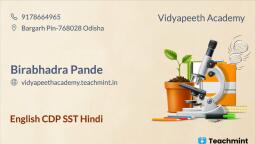Question 2 :
<b> Read the following poem carefully and answer the questions that follow by selecting the most appropriate option.</b> <br> <br> The sun descending in the west, <br> The evening star does shine; <br> The birds are silent in their nest, <br> And I must seek for mine. <br> The moon, like a flower, <br> In heaven’s high bower, <br> With silent delight <br> Sits and smiles on the might. <br> Farewell, green fields and happy groves, <br> Where flocks have taken delight. <br> Where lambs have nibbled, silent moves <br> The feet of angles bright; <br> Unseen they pour blessing, <br> And each sleeping bosom. <br> They look in every thoughtless nest, <br> Where birds are covered warm; <br> They visit caves of every beast, <br> To keep them all from harm. <br> If they see any weeping <br> That should have been sleeping, <br> They pour sleep on their head, <br> And sit down by their bed. <br> <br>The evening star rises when <br>
Question 3 :
<b> Read the following passage carefully and answer the questions that follow by selecting the most appropriate option.</b> <br> <br> Every evening, some part of the British Commonwealth hears the chimes of Big Ben, largest of the bells in the clock tower of the Palace of Westminster. The bell is popularly called Big Ben, and it is this bell which chimes out the quarter hours to the people of London. For Britons at sea or living in distant lands, the sound of Big Ben is still a link with home, for the chimes are broadcast each evening by the British Broadcasting Corporation. <br> Big Ben has been chiming out the quarter hours now for more than one-and-a-half centuries. It started chiming on June 11, 1859. At that time, the Parliament couldn't decide what to name the bell. A light-hearted Member of Parliament called attention, in a speech, to the impressive bulk of Sir Benjamin Hall, Queen Victoria's Chief Lord of the Woods and Forests. <br> “Call it Big Ben,” said the speaker, and the name stuck. <br> Big Ben is 9 feet in diameter, 7 feet 6 inches tall, and the thickness where the hammer strikes in 8.75 inches. <br> The clock that regulates the chiming of Big Ben keeps good time. In 1939, the Royal Astronomer made a 290-day check on the performance of the clock. He found that during this test, the margin of error was less than two-tenth of a second in 24 hours on 93 days and greater than one second only on 16 of the 290 days. <br> There was an unexpected lapse on August 12, 1945, and consternation swept through the Ministry of Works. On that dark day, the clock was five minutes slow. A flock of starlings had roosted on the minute hand. <br> <br>On August 12, 1945, Big Ben's clock was <br>
Question 4 :
<b> Read the following passage carefully and answer the questions that follow by selecting the most appropriate option.</b> <br> <br> Every evening, some part of the British Commonwealth hears the chimes of Big Ben, largest of the bells in the clock tower of the Palace of Westminster. The bell is popularly called Big Ben, and it is this bell which chimes out the quarter hours to the people of London. For Britons at sea or living in distant lands, the sound of Big Ben is still a link with home, for the chimes are broadcast each evening by the British Broadcasting Corporation. <br> Big Ben has been chiming out the quarter hours now for more than one-and-a-half centuries. It started chiming on June 11, 1859. At that time, the Parliament couldn't decide what to name the bell. A light-hearted Member of Parliament called attention, in a speech, to the impressive bulk of Sir Benjamin Hall, Queen Victoria's Chief Lord of the Woods and Forests. <br> “Call it Big Ben,” said the speaker, and the name stuck. <br> Big Ben is 9 feet in diameter, 7 feet 6 inches tall, and the thickness where the hammer strikes in 8.75 inches. <br> The clock that regulates the chiming of Big Ben keeps good time. In 1939, the Royal Astronomer made a 290-day check on the performance of the clock. He found that during this test, the margin of error was less than two-tenth of a second in 24 hours on 93 days and greater than one second only on 16 of the 290 days. <br> There was an unexpected lapse on August 12, 1945, and consternation swept through the Ministry of Works. On that dark day, the clock was five minutes slow. A flock of starlings had roosted on the minute hand. <br> <br>On August 12, 1945, Big Ben's clock was <br>
Question 5 :
<b> Read the following passage carefully and answer the questions that follow by selecting the most appropriate option.</b> <br> It is your duty to train and develop your mind and acquire knowledge, as much knowledge as you possibly, can obtain. Knowledge is like a deep well, fed by perennial springs and your Mind is the little bucket that you drop into it: you will get as much as you can assimilate. The Brain, which is the physical organ of the mind, is one of the two precious products of the aeons of Evolution: the other is the imponderable “Social instinct”. This wonderful Brain, whose every convolution represents millions of years of Time, really distinguishes you from the animals. Many animals have very powerful sense organs; the eagle, the ant and the dog have keener sense of sight than Man. But no animal has a more evolved Brain and higher Intelligence. If you do not develop and use this Brain to the utmost of your power, you are more akin to the beasts than to Homo-sapiens. <br> Knowledge and mental self-culture will confer untold blessings upon you. You will not be the victim of superstition and demagogy in religion and politics. You will know your duty and do it. To be wise and independent in your religion and your politics, not to be doped and duped by the selfish priests and the scheming politicians of Capitalism and so called socialism: is this not a noble aim worth striving for? Most men and women today are not free and wise: they are like kites flown by the priests and politicians who hold the string. They are fleeced and fooled on account of their ignorance. Half the ills of man are due to ignorance. <br>What, according to the passage, is the duty of human beings?
Question 6 :
<b> Read the following passage carefully and answer the questions </b> <br> <b>that follow by selecting the most appropriate option.</b> <br> Heights of Abraham are cliffs. These are one of the outstanding natural features of the city of Quebec in Canada and were the scene of a famous battle. Major General James Wolfe (1727-59) was only thirty-two years old when commanded by the British Prime minister, William Pit, to capture Quebec from the french during the seven year war (1756-63). The capture of the city lying on the banks of the St. Lawrence river in Eastern Canada, would open the way for the overthrow of the French forces in North America. For three months in the summer of 1759, Wolfe attempted to overcome the French by frontal attack from across the river, but the defenders held an almost impregnable position. Wolfe decided to make an attack from the rear in the early, dark hours of September 13. He held his army across the river above the town and surprised the French soldiers guarding the small cove which now bears his name. Then came the highly dangerous task of scaling the cliffs - the Heights of Abraham. By sunrise Wolfe and his army of 4000 had achieved their goal and were on the Plains of Abraham drawn up in battle array and ready to fight. <br> Before Wolfe's audacious plan had been carried to its successful conclusion, both Wolfe and the great French Commander, Montcalm, lay dying in the battlefield. Knowing that success was his, Wolfe whispered, I die contented.' On the other hand, when told that he was fatally wounded, Montcalm cried out. `Thank God! I shall not live to see the surrender of Quebec.' <br>Capturing Quebec would
Question 7 :
<b> A teacher, Amrita, uses various tasks such as creating charts, graphs, drawing, gathering information and presenting them through pair or group work. This differentiated instruction</b>
Question 8 :
<b> We use real objects to teach young learners new words because </b>
Question 9 :
<b> Read the following passage carefully and answer the questions that follow by selecting the most appropriate option.</b> <br> It is your duty to train and develop your mind and acquire knowledge, as much knowledge as you possibly, can obtain. Knowledge is like a deep well, fed by perennial springs and your Mind is the little bucket that you drop into it: you will get as much as you can assimilate. The Brain, which is the physical organ of the mind, is one of the two precious products of the aeons of Evolution: the other is the imponderable “Social instinct”. This wonderful Brain, whose every convolution represents millions of years of Time, really distinguishes you from the animals. Many animals have very powerful sense organs; the eagle, the ant and the dog have keener sense of sight than Man. But no animal has a more evolved Brain and higher Intelligence. If you do not develop and use this Brain to the utmost of your power, you are more akin to the beasts than to Homo-sapiens. <br> Knowledge and mental self-culture will confer untold blessings upon you. You will not be the victim of superstition and demagogy in religion and politics. You will know your duty and do it. To be wise and independent in your religion and your politics, not to be doped and duped by the selfish priests and the scheming politicians of Capitalism and so called socialism: is this not a noble aim worth striving for? Most men and women today are not free and wise: they are like kites flown by the priests and politicians who hold the string. They are fleeced and fooled on account of their ignorance. Half the ills of man are due to ignorance. <br>If one acquires knowledge and develops mental self-culture, one will not be the victim of
Question 11 :
Essays or long writing tasks especially on a discursive issue should
Question 12 :
<b> Read the following passage carefully and answer the questions that follow by selecting the most appropriate option.</b> <br> It is your duty to train and develop your mind and acquire knowledge, as much knowledge as you possibly, can obtain. Knowledge is like a deep well, fed by perennial springs and your Mind is the little bucket that you drop into it: you will get as much as you can assimilate. The Brain, which is the physical organ of the mind, is one of the two precious products of the aeons of Evolution: the other is the imponderable “Social instinct”. This wonderful Brain, whose every convolution represents millions of years of Time, really distinguishes you from the animals. Many animals have very powerful sense organs; the eagle, the ant and the dog have keener sense of sight than Man. But no animal has a more evolved Brain and higher Intelligence. If you do not develop and use this Brain to the utmost of your power, you are more akin to the beasts than to Homo-sapiens. <br> Knowledge and mental self-culture will confer untold blessings upon you. You will not be the victim of superstition and demagogy in religion and politics. You will know your duty and do it. To be wise and independent in your religion and your politics, not to be doped and duped by the selfish priests and the scheming politicians of Capitalism and so called socialism: is this not a noble aim worth striving for? Most men and women today are not free and wise: they are like kites flown by the priests and politicians who hold the string. They are fleeced and fooled on account of their ignorance. Half the ills of man are due to ignorance. <br>What, according to the passage, is the duty of human beings?
Question 13 :
<b> We use real objects to teach young learners new words because </b>
Question 15 :
<b> Read the following passage carefully and answer the questions </b> <br> <b>that follow by selecting the most appropriate option.</b> <br> Heights of Abraham are cliffs. These are one of the outstanding natural features of the city of Quebec in Canada and were the scene of a famous battle. Major General James Wolfe (1727-59) was only thirty-two years old when commanded by the British Prime minister, William Pit, to capture Quebec from the french during the seven year war (1756-63). The capture of the city lying on the banks of the St. Lawrence river in Eastern Canada, would open the way for the overthrow of the French forces in North America. For three months in the summer of 1759, Wolfe attempted to overcome the French by frontal attack from across the river, but the defenders held an almost impregnable position. Wolfe decided to make an attack from the rear in the early, dark hours of September 13. He held his army across the river above the town and surprised the French soldiers guarding the small cove which now bears his name. Then came the highly dangerous task of scaling the cliffs - the Heights of Abraham. By sunrise Wolfe and his army of 4000 had achieved their goal and were on the Plains of Abraham drawn up in battle array and ready to fight. <br> Before Wolfe's audacious plan had been carried to its successful conclusion, both Wolfe and the great French Commander, Montcalm, lay dying in the battlefield. Knowing that success was his, Wolfe whispered, I die contented.' On the other hand, when told that he was fatally wounded, Montcalm cried out. `Thank God! I shall not live to see the surrender of Quebec.' <br>Capturing Quebec would
Question 16 :
<b> Read the following poem carefully and answer the questions that follow by selecting the most appropriate option.</b> <br> <br> The sun descending in the west, <br> The evening star does shine; <br> The birds are silent in their nest, <br> And I must seek for mine. <br> The moon, like a flower, <br> In heaven’s high bower, <br> With silent delight <br> Sits and smiles on the might. <br> Farewell, green fields and happy groves, <br> Where flocks have taken delight. <br> Where lambs have nibbled, silent moves <br> The feet of angles bright; <br> Unseen they pour blessing, <br> And each sleeping bosom. <br> They look in every thoughtless nest, <br> Where birds are covered warm; <br> They visit caves of every beast, <br> To keep them all from harm. <br> If they see any weeping <br> That should have been sleeping, <br> They pour sleep on their head, <br> And sit down by their bed. <br> <br>The evening star rises when <br>
Question 17 :
<b> A teacher, Amrita, uses various tasks such as creating charts, graphs, drawing, gathering information and presenting them through pair or group work. This differentiated instruction</b>
Question 19 :
<b> Read the following passage carefully and answer the questions that follow by selecting the most appropriate option.</b> <br> It is your duty to train and develop your mind and acquire knowledge, as much knowledge as you possibly, can obtain. Knowledge is like a deep well, fed by perennial springs and your Mind is the little bucket that you drop into it: you will get as much as you can assimilate. The Brain, which is the physical organ of the mind, is one of the two precious products of the aeons of Evolution: the other is the imponderable “Social instinct”. This wonderful Brain, whose every convolution represents millions of years of Time, really distinguishes you from the animals. Many animals have very powerful sense organs; the eagle, the ant and the dog have keener sense of sight than Man. But no animal has a more evolved Brain and higher Intelligence. If you do not develop and use this Brain to the utmost of your power, you are more akin to the beasts than to Homo-sapiens. <br> Knowledge and mental self-culture will confer untold blessings upon you. You will not be the victim of superstition and demagogy in religion and politics. You will know your duty and do it. To be wise and independent in your religion and your politics, not to be doped and duped by the selfish priests and the scheming politicians of Capitalism and so called socialism: is this not a noble aim worth striving for? Most men and women today are not free and wise: they are like kites flown by the priests and politicians who hold the string. They are fleeced and fooled on account of their ignorance. Half the ills of man are due to ignorance. <br>If one acquires knowledge and develops mental self-culture, one will not be the victim of
Question 20 :
Essays or long writing tasks especially on a discursive issue should






























